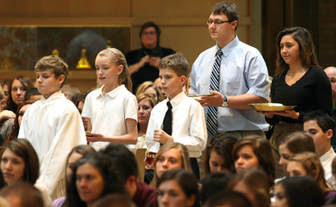Preparation of Gifts
National Liturgical Council

Within yourself are the offerings you must present in praise of God
Augustine of Hippo ‘Exposition of Psalm 55’
The question ‘What’s in a name?’ asked by Juliet in Shakespeare’s 'Romeo and Juliet' has taken on a life of its own. It is a good place to begin our reflection on what the General Instruction of the Roman Missal (GIRM) calls the ‘Preparation of the Gifts’. This name is important. Commonly and wrongly, we call this part of the Mass ‘The Offertory’. While the word ‘offerings’ is an alternative to the word ‘gifts’, as is seen in the language of the GIRM (a. 73) and the rubrics of the Missal (a. 22), there is no ‘offertory’ or ‘offering’ at this point. That takes place during the Eucharistic Prayer.
The name of this element of the Mass reveals its nature as preparatory. At the same time, it is the essential first part of the four-part eucharistic action.
Take > Bless > Break > Give
Sacral scriptures tell us various stories of the feeding of the multitudes (Matthew 14:13-21 and 15: 32-39) and stories of the Last Supper (Matthew 26: 26-29). In each you will find these four verbs that together shape our celebration of Eucharist which we do in memory of Jesus. The GIRM (a. 72) explains this. The presentation of the gifts of bread and wine mirrors Christ’s action of taking bread and wine.
Eucharist is not one moment. It is a four-part action, and every part is essential. Any one part loses its meaning and purpose when isolated from the other parts. There can only be a communion procession because there has first been a procession of the people to present their gifts to God to be ‘taken, blessed, broken and given’ through, with and in Christ and the unity of the Holy Spirit.
You might pay special attention to the prayers the presider prays in our name. This is a communal action. The prayer acknowledges the gifts of creation we have all received, the bread and wine we offer, the work of human hands, the desire that ‘we come to share in the divinity of Christ’.
In the quote above, Augustine leads us into the meaning of the mystery the ‘Preparation of the Gifts’ reveals. In presenting bread and wine, we are presenting ourselves to be blessed, broken open and given for the life of the world. The rite demands our full conscious and active participation. We must watch and listen if we are to join ourselves – all our relationships, our work, our joys and sorrows and griefs and anxieties, indeed the whole world – to the offering of Christ.
